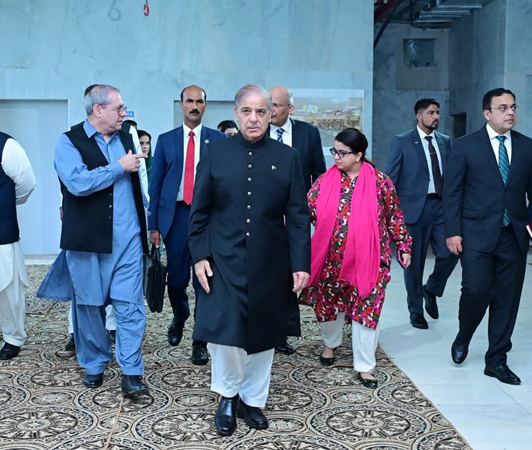Shaza Reveals Pakistan's Digital Dawn on Independence Day

Pakistan's Vision for a Digital Future
On August 15, Pakistan's Federal Minister for Information Technology and Telecommunication, Shaza Fatima Khawaja, presented the nation's "Digital Future" vision during Independence Day celebrations. The event, organized by the Ministry of Information Technology & Telecommunication and its allied organizations, brought together leaders from various sectors to honor the country's progress.
The minister reflected on the legacy of Quaid-e-Azam Muhammad Ali Jinnah, emphasizing his dream of a strong, progressive, and self-reliant Pakistan. She highlighted how this vision continues to inspire the nation's technological and social advancements. This year's Independence Day also marked a significant milestone: the success of Marka-e-Haq-Pakistan in May, where courage, professionalism, and technical expertise led to a historic victory.
This achievement not only became a defining moment in Pakistan's history but also served as a model for success across all aspects of life. Shaza linked the spirit of independence to the concept of "digital sovereignty," advocating for a technologically self-reliant nation through innovation and effective governance.
She acknowledged the contributions of the youth, women, entrepreneurs, and IT professionals, who are shaping an equitable and prosperous Pakistan. "With Marka-e-Haq, Pakistan redefined the rules of engagement to become a meaningful global player that cannot be ignored. On this 14th of August, we commit to using technology to redefine the rules of engagement for creating an equitable, prosperous Pakistan within our lifetime," she stated.
Key Pillars of the Digital Nation Vision
Shaza emphasized Prime Minister Shehbaz Sharif's "Digital Nation Pakistan" initiative, which is built on three core pillars: Digital Economy, Digital Society, and Digital Governance. These pillars aim to ensure the country moves forward as one, leveraging technology to leapfrog decades and become a developed nation.
She recognized the efforts of the Federal Cabinet, the Special Investment Facilitation Council (SIFC), the Armed Forces, and Field Marshal COAS General Syed Asim Munir for their leadership and sacrifices in advancing Pakistan's economic and technological growth. Their roles were crucial in securing the nation's recent achievements in Marka-e-Haq.
Pakistan has gained international recognition in the digital domain. The country was elevated to Tier-1 "Role Modelling" status in the Global Cybersecurity Index (GCI) 2024 and made a 14-place jump in the UN E-Government Development Index (EGDI), placing it in the "High EGDI" category for the first time.
Progress in Gender Equality and Digital Inclusion
Referring to the GSMA Gender Gap Report 2025, Shaza expressed pride in the reduction of the mobile internet gender gap from 38% to 25%. Over 8 million women began using mobile internet in FY 2024-25, with women's mobile internet usage nearly doubling from 10% to 19%. This milestone was a personal priority for the minister when she took charge of the ministry.
Roadmap for the Digital Nation Initiative
Under the "Digital Nation Pakistan" initiative, the future roadmap will focus on several key areas. These include youth empowerment, improved governance, industry facilitation, and the development of a Digital Public Infrastructure (DPI) to transform the country.
The National AI Policy 2025 has been approved, promoting AI innovation, ethical AI development, and economic growth. The National Fiberisation Initiative aims to expand high-speed internet access nationwide, while the IMT Spectrum Auction will ensure 5G readiness, boost foreign direct investment, and accelerate telecom growth.
Satellite internet services will be launched to connect all regions, and the "Uninterrupted Internet for IT Companies Policy" will guarantee consistent, high-quality connectivity to support IT exports and service delivery.
Training the Next Generation of IT Professionals
Under DigiSkills 3.0, the Ministry of IT & Telecom aims to train over 3.3 million IT professionals in the next three years. This includes 300,000 through Huawei and 200,000 through Google. These initiatives reflect a commitment to building a skilled workforce capable of driving Pakistan's digital transformation.

Comments
Post a Comment